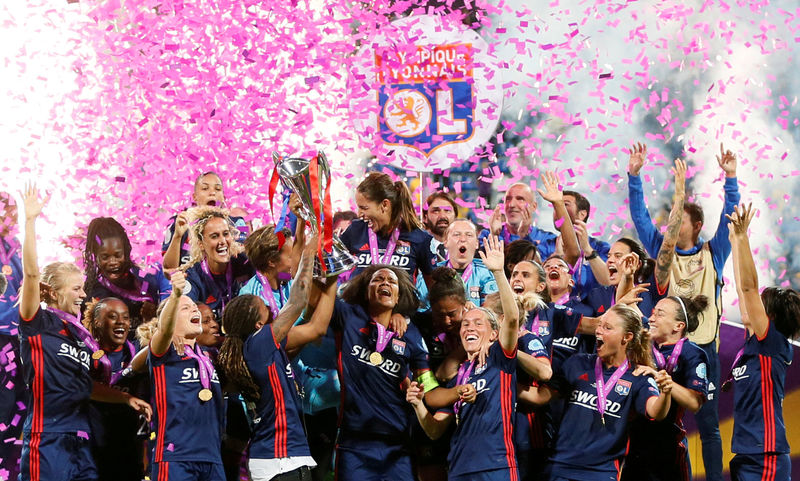By Christian Radnedge
LONDON (Reuters) - The Women's Champions League is beginning to step out of the shadow of its male counterpart with the ultimate aim of being as much of a must-see and commercially-attractive event, a UEFA official told Reuters on Tuesday.
This season's final in Budapest will be the first time the showpiece, in its current format, will be held in a different city to the men's Champions League final.
The decision was taken to allow the pinnacle of women's club football in Europe to have its own spotlight and not be overshadowed by the men's edition, which is one of the most viewed annual TV events in the world, surpassing the Super Bowl.
The sponsorship and broadcast rights to the women's final are currently sold by UEFA, with the previous rounds being managed by the clubs themselves.
However, Kayleigh Grieve, marketing manager for women's football at European soccer's governing body, said the ultimate aim was to part-centralise the rights selling process to give the game the platform it deserves.
"We're looking at that first step of bringing centralisation back to the quarter-finals to final and hope that may shape up the process," Grieve said on the sidelines of the Leaders XX Think Tank, held at Chelsea's Stamford Bridge stadium.
"But certainly broadcast will help us build more of the story of the Champions League because now putting it in a city is one thing, but we essentially drop in a match a year and try and grow an audience for it and we've not really told them anything about the lead up to that and built the interest and built the heroes of the matches, built the star players...
"We essentially want to get in a position where we can do that and that people at least recognise some of the names of the players and some of the clubs."
UNIQUE SPONSORS
The 2018 final was held in Kiev's Valeriy Lobanovskyi Dynamo Stadium, where Olympique Lyonnais beat VfL Wolfsburg 4-1 to win their third successive Champions League title - two days before Real Madrid achieved that feat in the men's edition.
The match attendance, however, was 14,237, the lowest for the women's final for four years.
With a bigger push from sponsors specifically invested in women's football, Grieve believed that number could see a big increase.
"It's just about making sure we present the competition as a strong product and bring in unique sponsors to the women's side," she said. "So we've unbundled that from the men's side and we're selling that in its own right...
"The partners previously were just given the women's rights which meant they hadn't committed their budgets to it, they hadn't got anything committed to the activation of the rights so it was just left languishing. They maybe took a few tickets, came to a few games but there was no activation around it.
"So at least this time if they do come on the programme, it will be because they specifically paid for it which means they will specifically activate around it..."
INTERNATIONAL PLANS
UEFA oversaw a record-breaking Women's European Championship last year, hosted and won by the Netherlands, in terms of attendances, TV viewers and online interactions.
Grieve said it was a distinct possibility that future editions of the women's World Cup or Euros could one day be as big as the respective men's tournaments.
"I understand the sentiment of it," she said. "They (FIFA) probably won't be far off. From what I've seen of the predictions of next year's Women's World Cup, is that they are going to eclipse a number of men's competitions - maybe not their own yet, but they are getting there.
"I don't see why it can't be as big, especially at a national team competition when you really tap into national pride, national interest and all those stories... So from a World Cup or Euros perspective I can see those competitions being massive."
World soccer body FIFA's governing council is still pondering proposals for a global women's nations league and an impatiently-awaited Club World Cup.

With UEFA appointing former world player of the year Nadine Kessler as their first head of women's football last year, the European body has the chance to lead the way for the women's game.